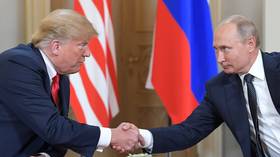Russiagate hysteria lives on: Election meddling sanctions bill has its day in the Senate
Mueller may have had his day, but the specter of Russian meddling still hangs over Washington. A bill newly introduced in the Senate promises to slap harsh sanctions on Russia should future election interference be discovered.
The ‘Defending Elections from Threats by Establishing Redlines’ (DETER) Act is the latest attempt by US lawmakers to squeeze Russia for a range of perceived election-related offenses. Introduced on Wednesday by Chris Van Hollen (D-Maryland) and Marco Rubio (R-Florida), it would require the Director of National Intelligence to determine within 30 days after every federal election whether Russia or any foreign government attempted to interfere.
If the DNI were to find such interference, it would require sanctions to be imposed on a list of Russian banks and energy companies. It would also prohibit US citizens from engaging in business with any entity owned by the Russian government, and freeze the assets of Russian political and business leaders targeted for sanction in the US.
The bill’s text, seen by Reuters, appears to be a carbon copy of a bill introduced by Van Hollen and Rubio in January 2018. That iteration of the DETER Act never made it past introduction, and has languished in Congressional limbo ever since.
While the bill pays lip service to targeting election interference from “China, Iran, North Korea, and other foreign governments of concern,” its main focus is undoubtedly Russia.
Whatever form any potential interference takes, six Russian banks would be immediately blacklisted: Sberbank, VTB Bank, Gazprombank, Vnesheconombank, Bank of Moscow and Rosselkhozbank. Ditto for Russia’s energy sector: the act requires “two or more” of Russian energy firms Gazprom, Rosneft, and Lukoil to be sanctioned if interference is discovered.
Also on rt.com Left opt for election scaremongering? Report claims ‘US dark money’ meddling in EuropeEstablishing what exactly constitutes ‘Russian interference’ is left up to the US intelligence agencies, reporting to the DNI.
Although the oft-repeated line is that “17 US intelligence agencies” found evidence of Russian interference in the 2016 election, only three of these agencies claimed to have noticed any foul play: the CIA, FBI and NSA. The DNI’s report, published in January 2017, was nevertheless characterized in the media as representing all 17 agencies.
After last year’s midterm elections, Director of National Intelligence Dan Coats issued a report concluding that “Russia, and other foreign countries, including China and Iran, conducted influence activities and messaging campaigns,” but were unsuccessful in influencing the vote. Coats’ report did not provide details of these “messaging campaigns.”
Sanctions are a favorite tool in the US diplomatic arsenal, but their effectiveness has been questioned. Russia has one of the world’s lowest debt to GDP ratios (somewhere around 13 percent), and has for years been selling off US bonds and stockpiling gold. In his state of the nation speech in February, Putin declared that Russia now has enough cash in its reserves to cover all of its external debt.
Think your friends would be interested? Share this story!















